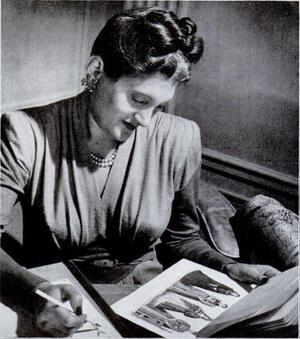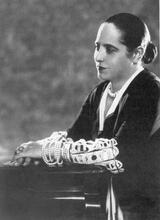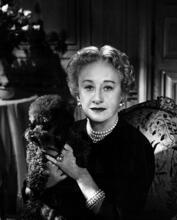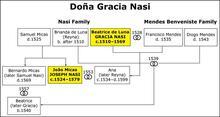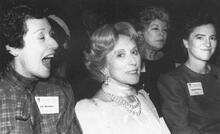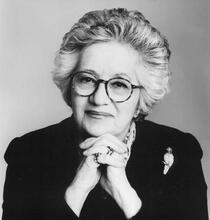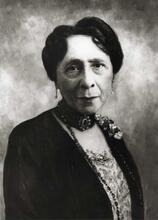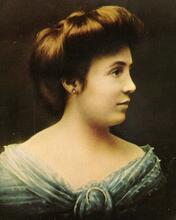Nettie Rosenstein
Nettie Rosenstein created tailored looks that fit a variety of body types and brought ready-to-wear fashion like the “little black dress” to American consumers. In 1916 she created her own custom dressmaking business out of her home, and by 1921 she employed fifty dressmakers in her midtown Manhattan dressmaking firm. Her dresses, which were carried in the finest department stores, were wildly popular even in the worst years of the Depression, grossing $1 million in 1937. While her dresses were up-market, the many knock-off copies of her designs meant that women of every income bracket wore dresses influenced by her aesthetic. Rosenstein was honored with a design award from Lord & Taylor in 1938 and the Coty Award in 1947.
Article
Fashion designer Nettie Rosenstein was instrumental in the popularization of the “little black dress” in America. She observed the trend in French couture and used the power of the ready-to-wear industry to popularize the look in America. Her career developed through the 1930s and 1940s, at a time when France lost some of its influence as the world’s fashion center. Rosenstein was one of many American dressmakers to gain from this change.
The youngest of three children, Nettie moved from Salzburg, Austria, to New York City with her parents, Joseph and Sarah Rosencrans, in the 1890s. Her parents opened a dry-goods store at 118th Street and Lenox Avenue. Dressmaking was a skill that she began to develop at a very early age. Her interest in and exposure to the fabrics in her parents’ store formed the backbone of her career. Nettie’s sister, Pauline, ran a millinery business known as Madame Pauline in the Rosencrans family house, next to the dry-goods store. Nettie began her career as a custom dressmaker for her sister’s clients.
In 1913, Nettie married Saul Rosenstein. They had two children, Jerome (b. 1914) and Claire (b. 1925). In 1916, Nettie Rosenstein started a custom dressmaking business in her home on West 117th Street. By 1921, she employed fifty dressmakers and had moved her business to a more fashionable address at East 56th Street. During the 1920s, Rosenstein switched to selling wholesale. By the late 1920s, I. Magnin, Neiman-Marcus, Nan Duskin, and Bonwit Teller were some of the stores that carried her clothing.
When Saul Rosenstein retired from his successful women’s underwear business in the late 1920s, Nettie Rosenstein tried retirement, too. Two years later, however, she began working for the dressmaking firm Corbeau & Cie. In 1931, she reopened her own dressmaking firm on West 47th Street with her sister-in-law, Eva Rosencrans, and her former boss at Corbeau & Cie., Charles Gumprecht. In spite of the Depression, Rosenstein’s business flourished, grossing $1 million in 1937. By 1942, she had moved her business again, to 550 Seventh Avenue.
Rosenstein’s designs were among the highest-priced wholesale clothes in New York City. Because they were so widely copied, the influence of her work went far beyond those who could afford her clothing. The reasons for her high prices were her use of high-quality materials and construction techniques, and her precise fit process. Each of her designs was first conceived on a showroom model, and then adapted in fit and proportion five times to five different-sized workroom models that represented the average figure. Rosenstein, who was given a design award in 1938 by the department store Lord & Taylor and who received the fashion industry’s Coty Award in 1947, contributed largely to the movement of the democratization of fashion in America during the first half of the twentieth century by making good-quality clothing of sophisticated design available for the ready-to-wear customer. Nettie Rosenstein died, after a long illness, at age ninety on March 13, 1980.
Harriman, Margret Case. “Very Terrific, Very Divine.” New Yorker (October 19, 1940): 28–34.
Obituary. NYTimes, March 15, 1980.
Steele, Valerie. Women of Fashion (1991).
WWWIA 7

